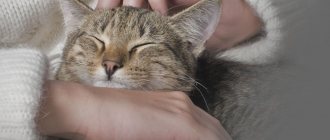Humanity is divided into catphiles, catphobes and those who have not yet defined their attitude towards domestic felines, and therefore treat them indifferently. Cats, in turn, are hostile to the former, but are not averse to communicating with the latter. They carefully scan the third ones: what if their disinterest is feigned, which means there is a chance to replenish the army of their fans.
The first guest is the sly one
Doesn't like cats, is interested in communicating with the owner. He sees a cat sitting in the hallway, realizes that this is everyone’s favorite, sharply bends down, reaches out his hand to pet the animal. He lavishes praise. He gets what he deserves for his cunning: “You’re kidding, boy,” the cat thinks. And the back arched, the fur stood on end, a menacing hiss, a paw strike, and flight. Until the stranger leaves, he watches him from hiding.
How to make friends with a cat?
Domestic cats are capable of becoming attached to their owner almost as strongly as dogs, but in order to become friends with a cat, it is not enough just to feed and stroke the purr from time to time. According to animal psychologists, it is much easier to achieve love and affection from a kitten than from an adult cat, since kittens perceive anyone who cares for them as their mother. But in order to win the heart of an adult animal, in addition to the direct responsibilities of caring for the cat, the owner needs to do the following:
- Do not do anything that the animal may perceive as aggression (do not look intently into the cat’s eyes, do not wave your arms near it, do not grab it in your arms when it is sleeping, do not throw it up or crush it during play, etc.)
- Under no circumstances should you show aggression towards a cat or take out negative emotions on it - many felines are vindictive and can remember an insult inflicted by a person for many years
- Behave calmly and evenly in the presence of an animal , do not raise your voice in front of or towards a cat
- Show respect for the animal - do not disturb its sleep, do not suddenly grab it, do not drag it by the tail even as a joke, do not take away food, etc.
- Find a way to bring joy to the animal - from time to time, in addition to the main food, give it special treats, play with the cat with its toys, allow it to sit on your lap and take it to bed with you, without squeezing or tugging the animal, take the cat out walk outside, etc.
These simple measures are aimed at ensuring that the animal always feels calm, pleasure and joy in the presence of the owner, and begins to associate these positive emotions with him. And with the right approach to keeping and communicating with a cat, sooner or later this independent animal will definitely change its anger to mercy and fall in love with its owner. And it’s very simple to find out when this moment comes - the cat will respond to your gaze with a direct gaze, blink several times, and then, without looking away, come up to be stroked and caressed.
Guest second, unspecified
As he himself believes, he is indifferent to animals. He entered, saw, smiled, squatted down (although before this meeting he had not interacted closely with cats), apparently he felt that this was the right thing to do. He opened his palms and calmly allowed himself to be sniffed. The cat appreciated the observance of etiquette standards, butted his hand and rubbed it on his knee. In response, the guest carefully ran his hand over the fur and looked up at the owners: would they mind?
The new acquaintance entered the apartment and took the offered seat. Fluffy immediately put his paws on his lap, blinked slowly, and slightly closed his eyes. The guest mechanically repeated the signal, and the cat settled down next to him, purring. “Our man: understanding, kind. It’s not for nothing that he was marked,” decided the true owner of the house.
What kind of people do cats like?
The answer to the question of what kind of people cats love lies in the psychology of these animals, namely, in the peculiarities of their lifestyle and preferences. Cats love comfort and warmth, they can bask in the sun for hours and sleep up to 20 hours a day, and also spend a lot of time taking care of themselves - licking their fur and paws, “washing themselves,” etc. Most of the time cats behave independently , leisurely and measured, and only sometimes they want to run, jump, sharpen their claws and chase each other or live or toy mice. Therefore, representatives of the cat family love people whose habits resemble them. And vice versa, cats treat with distrust and wariness those people who are very different in behavior from purrs - they fuss, make a lot of sudden movements, are in constant tension, etc.
Animal psychologists, observing cats and their owners, have found that cats show love and affection for people who seem understandable to them and at the same time do not pose a danger to them. And cats determine this very degree of similarity and human safety by the following criteria:
- Voice. Cats are attracted to people with a pleasant timbre of voice, who speak calmly, slowly and with soft intonations. And since nature has endowed women with a more gentle and pleasant-to-hear voice, it is not surprising that cats often love the fair sex more than men. However, a cat may well get used to a man’s voice and fall in love with its owner if he does not scream, hiss and make other sounds that are frightening and unpleasant for the animal in her presence.
Movements. Cats like people who move slowly and leisurely much more than fussy and impetuous individuals, since these animals can perceive sharp swings of their arms, a swift gait and any impetuous movements as a potential threat to themselves.- Smell. Everyone knows about the ability of dogs to distinguish many odors, but few people know that cats also have a very sensitive sense of smell and, not least of all, evaluate new acquaintances by smell. As a rule, felines do not like people who smell like dogs, other cats, alcohol, vinegar, or too strong perfume.
- Attitude towards the cat. Surely many cat owners have noticed that their furry purrs show much more sympathy for those guests who are indifferent to them, but they avoid people who immediately try to pick up or stroke the animal. The explanation for this love of cats for those who do not pay special attention to them is simple: cats, being independent animals, value their personal space and really do not like annoying pesters. The animal will most likely hide from a person trying to stroke and cuddle an unfamiliar cat at the first opportunity. However, natural curiosity is also inherent in cats, so sooner or later they will want to get to know and study a person who is next to them, but who is not paying attention to them.
Of all the family members , the cat will most likely choose the calmest person as his owner and pet, who feeds and cares for the animal, but at the same time does not impose his love on him - does not try to constantly squeeze and stroke him, does not bother him during sleep and rest, etc. And vice versa, cats are often indifferent to children and do not like to play with children too much, since these independent animals do not like to be carried for a long time in their arms, squeezed, dragged by the tail, and even more so, dressed up like a doll.
How do cats show love to humans?
Yes, about the same as people. Signs of a cat's love for a person are, first of all, expressed tactilely. A cat that is not indifferent to you will trample you with its paws, associating exclusively with you the positive emotions that the kitten experiences when it “tramples,” that is, massages the mother’s belly, stimulating the mammary glands.
Cats also love to rub their faces against their owners, thereby not only showing their tenderness, but also marking them with their scent. Also, if a cat loves you, she will probably lick you and sleep with you - quite possibly even on your head.
An important indicator of love is that a cat allows unpleasant procedures, such as grooming, to be carried out on itself. Of course, no one will allow a stranger to sort out the tangle. Of course, the purring of a cat and the moments when a devoted furry animal meets its owner are all unwise, but obvious signs of a cat’s love for its owner.
There are quite a lot of examples of how cats show love for humans, and after talking with an “avid” cat lover, you will get the impression that there is no more responsive and loving animal.
There is no doubt about whether cats feel human love. Certainly! As well as his indifference or rudeness. Therefore, even if the cat expresses its feelings at the wrong moment, still try to be gentle with it.
So why do we love these animals?
Cats are not known for their calm disposition and obedience. They often drop flowers from the windowsill, tear curtains, chew shoes and clothes, steal goodies from the table - in general, they create “complete chaos” in our lives... However, there are qualities in them for which we love our domestic cats and forgive them everything.
- They are cute . Especially kittens with their beautiful faces, small paws, clumsy and funny behavior. You want to take care of such a baby, play with him, hold him in your arms.
- They have a carefree and playful disposition . These creatures are unpredictable. Now your cat is sleeping curled up in a chair, and a few minutes later a vase falls with a crash in the living room, and a mustachioed prankster looks at a pile of fragments from above without a single hint of guilt - it’s impossible to get bored with such pranksters.
- Cats are independent and unobtrusive . Possessing the ability to subtly sense the mood of the owner, the animal understands when it is possible to approach him and cuddle him, and when he can fall under the “hot hand” and get hit on the ears.
- Cats can live in the house without going outside . This is a great advantage for those who, due to their workload, cannot find time to walk with their pet. And if the animal also goes to the toilet on its own and uses the toilet, caring for it will not be difficult at all.
- Cats are silent by nature . Unlike some sociable animals, the “mustachioed striped” pet will not pester you with its “talks”. Only as a last resort - if he has some need.
- Cats react calmly to children . It is not uncommon to see a child dragging a cat up with his paws, and the cat is so calm that it seems as if he has been moving like this all his life. And a cat whose child carries in a stroller is a “classic”, they simply enjoy their role as a “baby”.
- The hunting abilities of cats also win the hearts of many people. Our pets are born with a predatory instinct. They catch small animals, rodents and insects.
- They are warm and fluffy . Often cats cuddle up to us or lay down directly on us, warming us with their fur and the warmth of their bodies. You can warm your hands, feet, ears with them - it all depends on your imagination and the cat’s willingness to work as a heating pad.
I could go on for a very long time... there are a lot of reasons why we love these furry pranksters.










